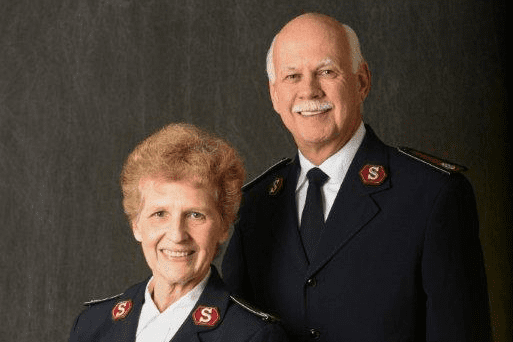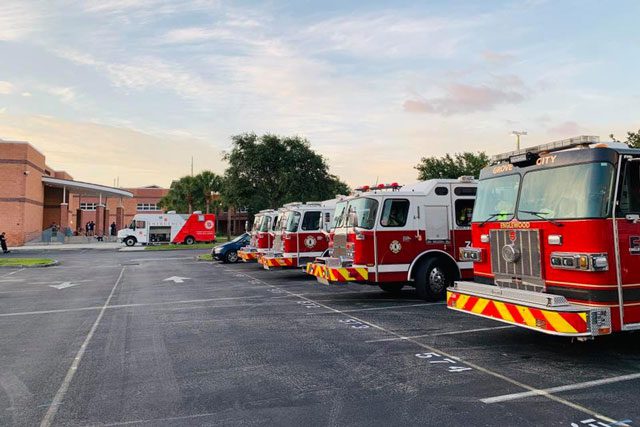New faith-based charities program raises
questions for the Army
BY ROBERT DOCTER –
The national commander, Commissioner John Busby, is highly enthusiastic about the development of President George W. Bush’s plan to involve faith-based charities and highly optimistic that the Army will be involved in some of the key advisory committees in regard to its implementation. In correspondence with Army officers, Busby said that the president’s plan “has begun a new level of discussion on church-state relations.”
“All of the major staff members within the White House Office of Faith-Based and Community Initiatives know the Army very well and appreciate what it has and can accomplish. Each has had prior association and exposure to particular Army programs,” Busby said.
 In a letter directly to Bush Busby noted: “It is a bold step and a very positive means of creating a new atmosphere and spirit both in our nation’s capital and across the country. Let me also commend the approach you are taking in beginning with audits of five government agencies to determine how well they are currently working with faith-based organizations. Identifying and eliminating barriers at the outset will move us much quicker into a partnership that will benefit many hurting people across the USA.”
In a letter directly to Bush Busby noted: “It is a bold step and a very positive means of creating a new atmosphere and spirit both in our nation’s capital and across the country. Let me also commend the approach you are taking in beginning with audits of five government agencies to determine how well they are currently working with faith-based organizations. Identifying and eliminating barriers at the outset will move us much quicker into a partnership that will benefit many hurting people across the USA.”
In separate letters to the key staff members, Steven Goldsmith, special assistant to the President for philanthropy and partnerships; John DiIulio Jr., office director; Mr. Don Eberly and Mr. Don Willett, both assistants to DiIulio, Busby commented on how pleasing it was to meet them and his awareness of their prior associations with the Army in different areas of the country.
Besides setting up the Office of Faith-Based and Community Initiatives, Bush also established parallel offices in the five principle cabinet offices that administer social programs. These are the departments of Health and Human Services, Housing and Urban Development, Justice, Labor, and Education.
During the announcement, Bush stated: “You can’t pay for praying. You can’t pay for love. You can’t pay for compassion to help others. We need faith-based and community groups to do that.” Busby also noted Bush’s comments following those words when he said it is his hope and belief that the country is on the verge of a religious revival of all faiths. Bush then added: “I know what it’s all about. I once was lost, but now I’m found.”
Army challenges
Unlike other denominations committed to social programs, the Army balances on a sharp edge in relation to the Constitution’s “establishment clause” that guarantees freedom of religion and separation of church and state. The Army maintains commitment to the vision of William Booth in its unity of purpose — that we will practice the will of God both by preaching the gospel and engaging in acts of mercy.
Organizational corporate leadership
The Roman Catholic church, the Lutherans, the Volunteers of America all have established separate corporations to deal with Federal dollars in support of their charitable activities. While Catholic Charities receives approximately 65% of its annual income from the U.S. government, the Army receives only 15%. Lt. Colonel Tom Jones, national community relations and development secretary, stated: “We won’t compromise our mission, but we will be sensitive to Constitutional requirements as we seek to carry it out.” Jones also noted the very large staffs of these other charities that work to facilitate these governmental grants. Currently, the Army has an extremely limited staff whose responsibilities touch on our relationship with government. Captain George Hood, assistant community relations secretary, has primary responsibility.
The Army currently has six separate corporations in this country — one for each of the four territories, the national headquarters, and The Salvation Army World Service Organization (SAWSO)–plus single asset corporations (Silvercrests). Jones stated that the national advisory board is discussing ways the Army can work even more effectively with government.
Avoiding dependence
With only 15% of our support coming from government the Army must maintain a constant donor support from private donors. People need the opportunity to continue to express their own love for humanity by trusting the Army to use their gifts in support of the poor and destitute in the best way possible. “We have a wonderful marriage with the American public, and I’m convinced they will continue to support us as government makes it possible for us to expand our services,” Jones said.
Dealing with barriers
In his challenge to the five cabinet agencies, Bush directed them to examine the barriers currently within law and ethics, which might inhibit the ability of faith-based charities to accept public money for service delivery. Busby stated that he has directed members of the national headquarters staff to examine any barriers currently in place which inhibit the Army’s ability to help those in need.
Regulations
One of the major concerns will be the development of the specific regulations aimed at faith-based agencies as they seek to assist the poor. At the announcement, Bush articulated the principles guiding the development of this new relationship. They are:
- The establishment of this office was not a signal of government withdrawal from social services but the establishment of a new level of partnership with those who are highly motivated to serve people.
- That government is not the answer to all problems, but that there must be a working relationship with faith-based and community groups across the country working with government to help individuals in need.
- The thought behind the new office was not that government would favor religion, but rather a signal that government was removing hostility to religion.
- Individuals seeking need would be given a choice of both religious or secular service providers.
- While the emphasis up until the point of the announcement had been on faith-based organizations, the name of the office clearly communicates that government would be working in a new way with both faith based and community efforts.
In the West
Lt. Colonel Raymond Peacock, secretary for program, stated: “We are optimistically cautious about the establishment of the White House Office of Faith-Based and Community Initiatives. It sounds like an opportunity for the concerns of faith-based organizations to be heard and the playing field leveled. The Salvation Army has a long and successful history working with federal grants and regulations. We should seize the opportunity to share what we have learned about retaining our strong spiritual identity while providing needed community services.”
Mr. Gordon Bingham, territorial social services secretary also noted the West’s long history of working with governments in support of a wide range of social services. “Other organizations are looking to see how we have managed this,” he said. “Before we jump on the bandwagon of a new partnership, we will want to evaluate carefully just how the climate and rules have changed. We will want to remain committed to the highest standards of service of which we are capable. We will want to continue to honor appropriate boundaries of church and state. If this new initiative should prove to be short-lived, we want to plan to be there and continue our work nonetheless.”
Bingham also identified the significant questions used in official program reviews at territorial headquarters to guide the approval of programs. They are:
- Is the program in harmony with the Salvation Army’s mission?
- What restrictions are imposed by government contracts on the spiritual ministry? Do they invalidate the desirability of The Salvation Army operating the program?
- Will adequate staffing be provided through qualified personnel who will support the Army’s mission?
- Is provision made for adequate and appropriate facilities?
- How will the program be presented in signage and publicity materials?
- Have needed licenses, occupancy and building use permits been secured?
- Are operating costs appropriately addressed?
- Are operating standards/policies adequate for the benefit of clients? Do they meet Salvation Army standards where appropriate? Do they comply with state and local government requirements? Are insurance requirements met?










